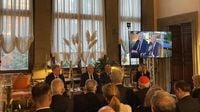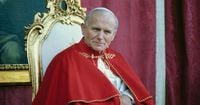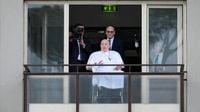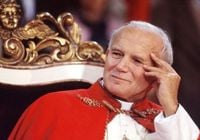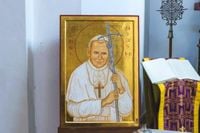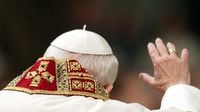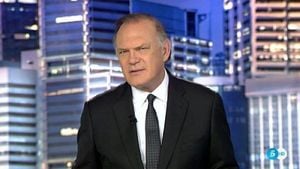On April 2, 2005, the world mourned the passing of Pope John Paul II, a figure whose influence transcended borders and generations. As the first non-Italian Pope in nearly 500 years, Karol Wojtyła left an indelible mark on the Catholic Church and the global community. On this somber anniversary, reflections on his legacy and the impact of his death resonate deeply, particularly in the context of recent events surrounding Pope Francis.
Reports from the ANSA archives reveal that on the evening of his death, Cardinal Leonardo Sandri announced the news to a packed St. Peter's Square, where thousands gathered in anguish and disbelief. The atmosphere was charged with emotion as the lights in the Pope's apartment were turned on, prompting applause and cheers from the faithful below. It was a poignant moment, encapsulating the deep connection between the Pope and his followers.
In a heartfelt message to the youth, Pope John Paul II expressed, "I have looked for you, now you have come to me and for this I thank you." These words, reconstructed by spokesperson Navarro, highlighted his enduring bond with the younger generation, a theme that echoed throughout his papacy.
As the bells of St. Peter's tolled an hour after his death, the streets of Rome filled with mourners, many of whom were still unaware of the tragedy that had unfolded. Reports described the scene along Via della Conciliazione, where the collective grief was palpable among those making their way to St. Peter's Square. The Pope's death marked not only the end of an era but also the beginning of a profound sense of loss for millions around the globe.
Two decades later, the memory of John Paul II remains vivid, especially in light of Pope Francis's recent health struggles. Francis spent 38 days hospitalized at the Gemelli hospital, a situation that has drawn parallels to John Paul II's own health challenges in the years leading up to his death. The Pope's fragility has sparked discussions about the nature of suffering and leadership within the Church.
Loris Zanatta, a professor of Latin American history at the University of Bologna, noted that the current situation reflects a shift in the papacy's approach to suffering. He remarked, "The pedagogical value of suffering is a distinctive feature of Latin American history. It serves as a cry against the modern world, which has distanced itself from God." This perspective resonates with the teachings and experiences of both John Paul II and Francis, who have emphasized the importance of embracing vulnerability.
During his pontificate, John Paul II was known for his remarkable ability to connect with people from all walks of life. His motto, "Totus Tuus"—meaning "Totally Yours"—embodied his devotion to the Virgin Mary and his commitment to the Church. He famously donated the bullet that nearly took his life during an assassination attempt to the Madonna of Fatima, signifying his unwavering faith.
John Paul II's legacy includes a record number of canonizations, having proclaimed 482 saints and 1345 servants of God during his time as Pope. His extensive travels, visiting 129 countries for 170 apostolic journeys, earned him the title of the "Pope of the People." He was a vocal advocate for interfaith dialogue, famously opening the Holy Door at St. Paul's Outside the Walls during the Jubilee of 2000 alongside leaders of other Christian denominations.
His passionate stance against the mafia during a visit to Sicily in 1991 remains iconic, as he called for repentance and a return to moral values. This moment exemplified his commitment to social justice and the dignity of all people, a theme that continues to resonate in the teachings of Pope Francis.
As the world reflects on the legacy of John Paul II, it is essential to acknowledge the impact of his death on the Catholic Church and its followers. His funeral on April 8, 2005, drew millions, and his canonization on April 27, 2014, further solidified his status as a beloved figure in Catholic history.
In a recent event commemorating John Paul II, Cardinal Marcello Semeraro highlighted the Pope's ability to awaken a sense of the divine in the world. He remarked on John Paul II's deep spirituality and his role in translating the teachings of the Second Vatican Council into a living tradition for the Church.
The connection between John Paul II and Pope Francis is evident in their shared commitment to the people of God. Francis's recent health issues have prompted reflections on the nature of leadership, suffering, and the Church's mission in a rapidly changing world. As Zanatta pointed out, the fragility of both popes serves as a reminder of their humanity and the importance of community in the face of adversity.
As the anniversary of John Paul II's death approaches, the Catholic Church stands at a crossroads, grappling with the lessons of the past while looking toward the future. The legacy of John Paul II continues to inspire and challenge believers, urging them to embrace their faith with courage and compassion.
In the end, the memory of Giovanni Paolo II is not merely a reflection on a past leader but a call to action for the present and future generations. His life and teachings remind us of the power of faith, the importance of community, and the enduring strength found in vulnerability.
